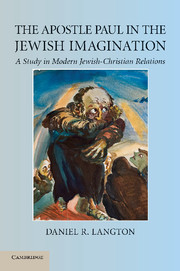Book contents
- Frontmatter
- Contents
- Acknowledgments
- Introduction
- PART I THE APOSTLE PAUL AND POPULAR JEWISH CULTURAL IDENTITY
- PART II THE APOSTLE PAUL AND JEWISH RELIGIOUS IDENTITY: NEW TESTAMENT STUDIES AND THEOLOGICAL APPROACHES
- PART III THE APOSTLE PAUL AND JEWISH INTEREST IN THE JUDEO-CHRISTIAN TRADITION: ARTISTIC AND LITERARY APPROACHES
- 5 An Oratorio by Felix Mendelssohn, a Painting by Ludwig Meidner, and a Play by Franz Werfel
- 6 The Novels of Shalom Asch and Samuel Sandmel
- PART IV THE APOSTLE PAUL AND JEWISH CRITIQUES OF THE PLACE OF RELIGION IN SOCIETY: PHILOSOPHICAL AND PSYCHOANALYTICAL APPROACHES
- Conclusion
- Appendix: The Story of Abbu Gulish in The Book of Tales
- Bibliography
- Scripture and Other Ancient Writings Index
- General Index
- References
5 - An Oratorio by Felix Mendelssohn, a Painting by Ludwig Meidner, and a Play by Franz Werfel
Published online by Cambridge University Press: 07 May 2010
- Frontmatter
- Contents
- Acknowledgments
- Introduction
- PART I THE APOSTLE PAUL AND POPULAR JEWISH CULTURAL IDENTITY
- PART II THE APOSTLE PAUL AND JEWISH RELIGIOUS IDENTITY: NEW TESTAMENT STUDIES AND THEOLOGICAL APPROACHES
- PART III THE APOSTLE PAUL AND JEWISH INTEREST IN THE JUDEO-CHRISTIAN TRADITION: ARTISTIC AND LITERARY APPROACHES
- 5 An Oratorio by Felix Mendelssohn, a Painting by Ludwig Meidner, and a Play by Franz Werfel
- 6 The Novels of Shalom Asch and Samuel Sandmel
- PART IV THE APOSTLE PAUL AND JEWISH CRITIQUES OF THE PLACE OF RELIGION IN SOCIETY: PHILOSOPHICAL AND PSYCHOANALYTICAL APPROACHES
- Conclusion
- Appendix: The Story of Abbu Gulish in The Book of Tales
- Bibliography
- Scripture and Other Ancient Writings Index
- General Index
- References
Summary
For some the very idea of ‘Jewish art’ is nonsensical, the paucity of artistic material of any kind generated down through the centuries being attributed to the second commandment's prohibition of graven images. Amongst others, the debate about what exactly constitutes ‘Jewish art’ falls into two schools of thought: it is understood either to be art produced by Jews, or art whose subject matter is about Jewish life or Judaism. Of course, any definition that regards Jewish art as a reflection of the Jewish experience is a very broad definition indeed, bearing in mind the varieties and complexities of the modern Jewish experience. Arguably, one unifying theme of modern Jewish art is the exploration of identity; and in this the interests of Jewish artists dovetail neatly with those of other Jewish intellectually creative efforts. One might well have predicted as much, considering how Jewish artists have struggled to find a place for themselves and their own interests in a Western culture dominated by Christian themes and motifs, or when one thinks of the number who have been refugees of one sort or another. Another common theme which makes perfect sense for a Jewish artist struggling to make sense of his identity in a Christian world, and which is again shared with nonartistic forms of Jewish discourse, is that of biblical interpretation.
- Type
- Chapter
- Information
- The Apostle Paul in the Jewish ImaginationA Study in Modern Jewish-Christian Relations, pp. 178 - 209Publisher: Cambridge University PressPrint publication year: 2010



